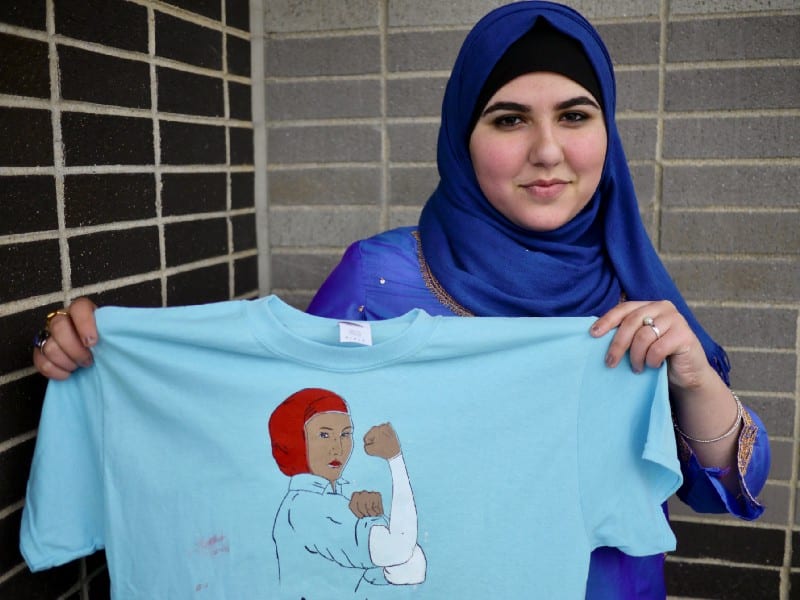
Malak Afaneh, de diecisiete años, estaba aprendiendo sobre Rosie la Remachadora en una clase de su instituto de Chicago cuando se le ocurrió una idea: ¿Y si Rosie fuera musulmana?

Malak Afaneh, de diecisiete años, estaba aprendiendo sobre Rosie la Remachadora en una clase de su instituto de Chicago cuando se le ocurrió una idea: ¿Y si Rosie fuera musulmana?
Con la ayuda de una amiga, diseñó una camiseta que mezclaba "el patriotismo estadounidense y mis ideales musulmanes de llevar el pañuelo para apoyar el feminismo islámico" y empezó a venderla para recaudar fondos para la Fundación Zakat, que apoya a los refugiados sirios. Los 130 ejemplares que imprimió en enero se agotaron rápidamente a raíz del veto migratorio del presidente Trump y ahora está trabajando con un grabador profesional para crear más.
Borderless se reunió con Afaneh para hablar de su proyecto y de la vida de los inmigrantes en Chicago.
Es difícil ser inmigrante en Chicago, porque a veces sientes que tienes que ceder totalmente a ser estadounidense. Realmente quieres adaptarte a la sociedad lo mejor que puedas porque quieres las mismas oportunidades, la misma educación. A veces parece que hay un choque de culturas e identidades.
Mi abuela y su familia eran Refugiados palestinos que huyeron a Jordania durante la guerra de 1967. Más tarde, mi abuela se casó y tuvo una nueva vida en Jordania. Era demasiado peligroso para ella volver a Palestina, donde no estaría económicamente estable ni segura. A toda la familia se le negó el acceso a las fronteras palestinas, como a muchos otros refugiados. Así que toda mi familia vive en Jordania y mi madre nació allí junto con mis tías. Estamos muy orgullosos de nuestra cultura.
Nací en Alemania cuando mi madre trabajaba allí. Decidimos venir aquí cuando yo tenía dos años. Mi abuela y mi madre son grandes fuentes de inspiración para mí. Mi madre me crió en este país cuando tenía 25 años. Y vino aquí sin nada a la espalda y sólo con un inglés básico. Ahora tiene un doctorado y es profesora. Ella me ha enseñado que todo es posible si trabajo duro.
Creo que a mucha gente no se le enseña sobre el Islam y lo que el hiyab significa. Miran los medios de comunicación y tienen la idea preconcebida de que las mujeres musulmanas están oprimidas o de que el Islam promueve la violencia o cosas por el estilo. Por eso, al haberme criado aquí, en general he tenido una experiencia muy positiva. Mucha gente se me ha acercado y me ha preguntado por qué llevo la camiseta musulmana. hiyab, y es estupendo que se interesen por mi fe. Pero también he tenido malas experiencias.
Una vez estaba hablando por teléfono en árabe en una parada de autobús y había una señora que no dejaba de mirarme. Al final dijo: "Dios mío, el ISIS está por todas partes". Y eso me impactó. Me quedé en estado de shock. No sabía si reír o llorar. Supuso que por hablar mi idioma y llevar un pañuelo era una terrorista o promovía la violencia.
Es importante que la gente entienda realmente qué es el Islam. Islam viene de la raíz árabe salamque significa paz. Así que cuando alguien dice terrorismo islámico, me gustaría que la gente pudiera ver que eso es un enorme oxímoron. El terrorismo pacífico es una gran contradicción.
Llevo el pañuelo porque es un símbolo de mi modestia y de que soy una mujer musulmana. Me gusta llevarlo porque la gente ve claramente quién soy. Cuando me ven cubierta ven que elijo desexualizarme de ciertos cánones de belleza. La gente se centra en mi personalidad y mi inteligencia, que significan mucho más para mí que lo que pueda decir mi cuerpo. Así que es una forma de que la gente me conozca.
Empecé a trabajar como voluntaria en campos de refugiados sirios en Jordania en 2012, cuando estaba en séptimo curso. Mis tías me dejaron trabajar con una organización llamada Sociedad Badr. Trabajan directamente con campos de refugiados en Jordania, cerca de las fronteras y en otros lugares, y ayudan a construir casas y a organizar colectas de alimentos. Hablamos con las familias y los niños y vemos exactamente lo que necesitan y les ayudamos.
A veces hacemos barbacoas sencillas y llevamos a los niños a centros comerciales y les compramos ropa, porque necesitan sus necesidades pero también necesitan un sentimiento de felicidad y conexión humana emocional, porque han perdido mucho de eso. Trabajar en los campos me abrió los ojos. Esta es mi gente y me entienden, así que no era solo una extranjera que intentaba ayudar, me trataban como a su hija. Así que pude trabajar con ellos, pero también pude aprender de ellos. Aprendí resiliencia, determinación y a estar agradecida por cosas en las que no pensarías en tu vida diaria.
Mientras trabajaba como voluntaria, vi exactamente cómo se gastan los limitados recursos y cuánto más necesitan. Hay veces en que realmente queremos ayudarles, pero no tenemos dinero. Así que pensé que debía donar e intentar marcar la diferencia. No estoy en Jordania, pero quiero ayudar. Así que todos los fondos de las camisetas van a la Fundación Nacional Zakat porque los refugiados ahora mismo necesitan todo el dinero que puedan conseguir, especialmente con la prohibición de viajar del presidente Trump.
La prohibición de viajar fue desalentadora porque hay mucha gente que solo quiere venir aquí porque no tiene adónde ir. Pero tengo que decir que estoy sorprendida y abrumada por lo dispuesta que ha estado la gente a ayudar en esa situación. En el aeropuerto de O'Hare, en las concentraciones y en las protestas, la gente se está informando sobre el islam para ayudar a detener la orden ejecutiva.

